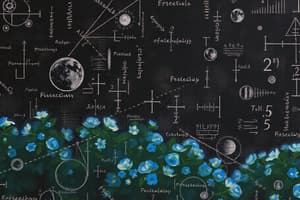Podcast
Questions and Answers
Which branch of mathematics focuses on the study of shapes and their properties?
Which branch of mathematics focuses on the study of shapes and their properties?
- Geometry (correct)
- Statistics
- Number Theory
- Algebra
What type of mathematical operations does calculus primarily deal with?
What type of mathematical operations does calculus primarily deal with?
- Integer properties
- Discrete structures
- Continuous change (correct)
- Basic arithmetic
Which of the following is NOT a fundamental concept in mathematics?
Which of the following is NOT a fundamental concept in mathematics?
- Graphs (correct)
- Variables
- Functions
- Proof
What is the primary focus of probability in mathematics?
What is the primary focus of probability in mathematics?
Which operation is considered repeated subtraction?
Which operation is considered repeated subtraction?
What is an integral part of problem-solving strategies in mathematics?
What is an integral part of problem-solving strategies in mathematics?
Which of the following is used to collect and interpret data in statistics?
Which of the following is used to collect and interpret data in statistics?
What does the order of operations refer to in mathematics?
What does the order of operations refer to in mathematics?
Flashcards
Branches of Mathematics
Branches of Mathematics
Mathematics is a group of areas that interconnect and study different kinds of topics like numbers, shapes, data and continuous change.
Arithmetic
Arithmetic
Arithmetic deals with basic math operations like adding, subtracting, multiplying and dividing numbers.
Functions
Functions
Relationships between inputs and outputs, often expressed as equations and graphs.
Variables
Variables
Signup and view all the flashcards
Equations
Equations
Signup and view all the flashcards
Sets
Sets
Signup and view all the flashcards
Order of operations
Order of operations
Signup and view all the flashcards
Problem Solving Strategies
Problem Solving Strategies
Signup and view all the flashcards
Study Notes
Branches of Mathematics
- Mathematics is a vast field encompassing various interconnected branches.
- Arithmetic deals with basic operations like addition, subtraction, multiplication, and division.
- Algebra involves using symbols and variables to represent and manipulate mathematical relationships.
- Geometry focuses on shapes, space, and their properties.
- Calculus studies continuous change and deals with concepts like differentiation and integration.
- Statistics deals with collecting, analyzing, and interpreting data.
- Probability studies the likelihood of events occurring.
- Number theory investigates properties of numbers, particularly integers.
- Discrete mathematics focuses on countable objects and their relationships.
- Topology studies shapes and their properties under continuous deformations.
Fundamental Concepts
- Sets: Collections of objects. Operations like union, intersection, and complement are crucial.
- Functions: Relationships between inputs and outputs. Functions can be linear, quadratic, exponential, or others.
- Variables: Symbols representing unknown quantities. Can be independent or dependent.
- Equations and Inequalities: Statements expressing relationships between variables. Used to solve for unknowns.
- Proof: A logical argument demonstrating the truth of a statement.
Mathematical Operations
- Addition: Combining values.
- Subtraction: Finding the difference between values.
- Multiplication: Repeated addition.
- Division: Repeated subtraction.
- Exponents: Repeated multiplication.
- Roots: Finding the value that, when multiplied by itself, gives the original value.
Problem-Solving Strategies
- Identify the problem.
- Gather information.
- Analyze the information.
- Develop a plan.
- Execute the plan.
- Evaluate the solution.
Applications of Mathematics
- Science: Models and predictions based on mathematical principles.
- Engineering: Designs and calculations for structures and systems.
- Finance: Budgeting, investment analysis, and risk management.
- Computer Science: Algorithms, data structures, and programming.
- Social Sciences: Analyzing trends, predicting behaviour.
Important Mathematical Tools
- Graphs: Visual representations of data.
- Diagrams: Visual representations of relationships.
- Formulas: Equations that express relationships.
- Tables: Organized data in rows and columns.
Key Mathematical Principles
- Order of operations: Rules for evaluating expressions in a specific sequence.
- Properties of equality: Rules that allow transformations of equations.
- Properties of numbers: Fundamental characteristics of numbers, like commutativity and associativity.
Different Number Systems
- Natural numbers: Counting numbers (1, 2, 3...).
- Whole numbers: Natural numbers and zero (0, 1, 2, 3...).
- Integers: Whole numbers and their negatives (-3, -2, -1, 0, 1, 2, 3...).
- Rational numbers: Numbers that can be expressed as a fraction (p/q), where p and q are integers, and q is not zero.
- Irrational numbers: Numbers that cannot be expressed as a fraction.
- Real numbers: All rational and irrational numbers.
- Complex numbers: Numbers involving the imaginary unit 'i'.
Studying That Suits You
Use AI to generate personalized quizzes and flashcards to suit your learning preferences.




